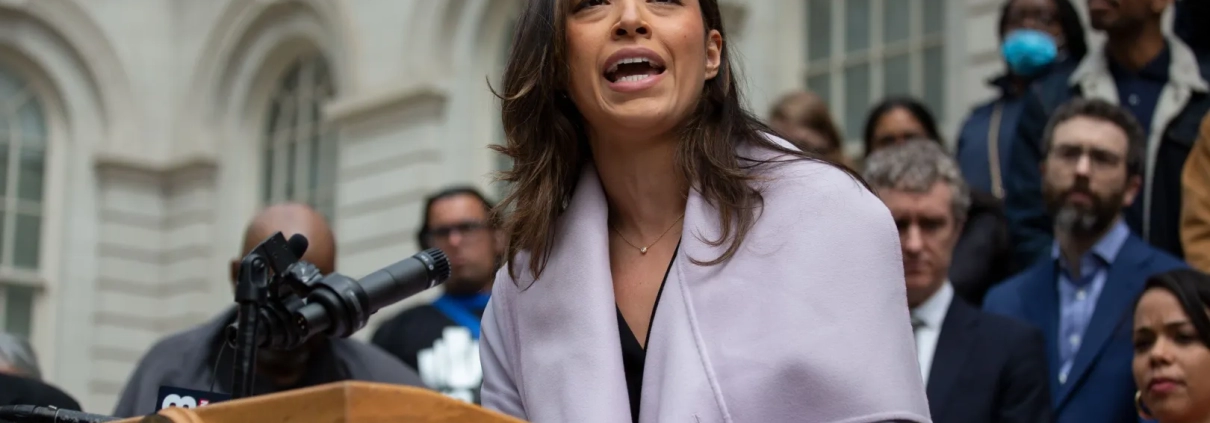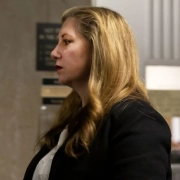Demand Grows to Make Rikers Island Death Reports Public
Ben Fractenberg/THE CITY
Manhattan City Councilmember Carlina Rivera is among those pressing for transparency amid a record number of fatalities.
Anytime someone dies inside a city jail, the agency in charge of medical care launches a comprehensive review of what happened, with an eye toward preventing future detainee deaths.
But the morbidity and mortality reports conducted by Correctional Health Services are never made public, and their “corrective action” recommendations are rarely shared with anyone outside of city government.
Critics say this lack of transparency enables the city Department of Correction to ignore recommended fixes and puts the lives of incarcerated people at risk.
“What policies and practices have the Department of Correction and Correctional Health Services changed as a result of their reviews into deaths in custody?” asked Martha King, former executive director of the Board of Correction, which is the department’s primary oversight body. (King now works for the Revson Foundation, one of THE CITY’s funders.)
“Without transparency about the findings of these reviews, we don’t know,” added King. “This is about basic accountability for improving care and preventing future deaths.”
Eight people have died behind bars this year so far, including three at the George R. Vierno Center, one of eight jails on Rikers Island. In 2022, city jails saw 19 deaths — the highest number in decades.
The fatalities, and years of failed reforms, have led to increased calls for a federal receiver to take over the Department of Correction. A federal judge overseeing the department has agreed to hear arguments in favor of outside management.
Transparency and Accountability
As for the death reviews, Correctional Health Services officials contend the Health Insurance Portability and Accountability Act (HIPAA) bars them from sharing any part with the public — including redacted versions or even just the corrective action recommendations.
The reviews are “privileged” under state law “to ensure quality patient care in the community,” said Nicole Levy, a spokesperson for Correctional Health Services, which is part of the public NYC Health + Hospitals Corporation.
City Councilmember Carlina Rivera (D-Manhattan), who chairs the council’s Criminal Justice Committee, wants to force Correctional Health Services to make basic parts of the reviews public and require jail officials to put the word out within hours of any death behind bars.
“We have historical levels of violence and death on Rikers,” Rivera told THE CITY. “And it’s critical that the Council leverage its [city] charter-mandated oversight responsibilities to require transparency and accountability at every opportunity.”
The morbidity and mortality reports must be opened to the public, Rivera said, as a prerequisite to any improvements in the jail system.
“Without the ability to review corrective action recommendations, it is more difficult to hold the administration accountable,” she said.
The lawmaker also plans to require jail officials to issue press releases shortly after each death.
Under Wraps
In May, THE CITY reported that DOC suddenly stopped telling the media when detainees died.
Frank Dwyer, a department spokesperson, said at the time that the decision to no longer go public with detainee deaths “was a practice, not a policy.”
Correction Commissioner Louis Molina later said the change was made to protect family members from learning about the loss of a loved one via a media report.
But the DOC press team never included the name of the person who died without first notifying that person’s next of kin.
In response to criticism, the department began notifying reporters about deaths again — as long as they asked to be added to a special list.
Rivera wants to “codify” the rule to make sure that no one who dies in jail is “erased.”
“There is absolutely a way to still notify people of the conditions inside the jail without putting someone’s name and demographic information out there,” she said. “The public still deserves to know that people are going into our jail system under the care and custody of the Department of Correction and dying. That is not something that should be happening regularly.”
The findings from the death reviews are so tightly kept under wraps that Correctional Health Services does not even publicly acknowledge who receives them.
A Slow Pace
Jail death reviews are also conducted by the Board of Correction and the state’s Commission of Correction.
They post their findings online but frequently take months, and in some cases years, before making them public.
For each death, the Commission of Correction took an average of nearly two and a half years to complete its probes, THE CITY reported in July 2020.
Critics say reporting delays have made it impossible to identify trends while they are happening. The majority of deaths the commission examines occur in state prisons, records show.
As for Rikers, Steve Martin, the court-appointed federal monitor for the Department of Correction, slammed the commissioner’s lack of transparency and asked the judge overseeing the case to hold the administration of Mayor Eric Adams in contempt for failing to implement basic policy recommendations.
Martin and his team also said they were “deeply concerned” about the spike in deaths since 2020.
“Particularly those related to poor security practices, operational failures, suicide, and overdose,” his latest report said.
Martin noted the city has hired an expert to “advise on needed practice improvements” and conducts death reviews and suicide prevention training.
But, he added, “the pace of this work has moved far too slowly.”
“Severe risks to the lives of people in custody remain, and housing areas across the department are rampant with security lapses that heighten the risk of serious injury or an in-custody death in every housing area,” he said.
Missing Health Care
Martin cited that DOC and Correction Health Services have “initiated” morbidity and mortality reviews for the jail deaths that have occurred in 2023.
Critics of the department note that incarcerated people miss thousands of medical visits each year.
Many of those appointments get canceled because correction officers are unavailable — or unwilling — to transport incarcerated people to medical clinics, according to the data.
Molina and his team have tried to make it easier for detainees to walk themselves to clinics in their facilities.
Still, the monthly number of missed medical visits has spiked by 21%, from 9,259 in August 2022 to 11,176 in June 2023, outpacing growth in the jail population.
“Current leadership made little progress on persistent issues of jail conditions, forcing me to conclude that the City of New York is unwilling or unable to address the humanitarian and safety issues at Rikers,” said city Comptroller Brad Lander, whose office publishes monthly reports about the Department of Correction.
In one case, Dashawn Carter missed 92 medical appointments during his three stints in jail dating back to 2018, THE CITY reported in July 2022.
The 25-year-old Staten Islander, who suffered from mental illness and was homeless, took his own life inside a housing unit in the Anna M. Kross Center on Rikers on May 7, 2022.
Correctional Health Services refused to disclose how many medical visits Carter missed, citing HIPAA. The information is as released by the Board or Correction via a Freedom of Information Law request.
Some family members whose loved ones have died in Rikers say they have been left in the dark by city officials.
Medical officials in the private sector have conducted death reviews for decades.
Dr. Jeanne Huddleston, an expert in death reviews at the Mayo Clinic, said they should be used to identify patterns — and be shared with all medical staff to push for a grassroots change.
“Doing mortality reviews does not save lives,” she said during an online webinar. “Only identifying common patterns of process failures … and targeting and prioritizing an improvement initiative … will make a meaningful, measurable difference.”
For people like Tamara Carter, the death reviews are personal.

Ben Fractenberg/THE CITY
Her son Brandon Rodriguez, 25, reportedly took his life inside a shower on Rikers in August 2021.
It took months before his cause of death was determined, and details about how medical staff cared for him beforehand remain sparse.
Carter noted her son had tried to take his life during a prior stint on Rikers but was still placed in the general population.
“If they had all of his medical records at intake maybe he’d be alive today,” she said, noting he suffered from bipolar disorder and multiple sclerosis.
As for the death reviews, she urged medical staff to at least share them with on-the- ground clinicians.
“They need to be watched at all times,” she said, referring to Correctional Health Services and the Department of Correction. “They are like a mob. They are doing everything undercover.”









Leave a Reply
Want to join the discussion?Feel free to contribute!